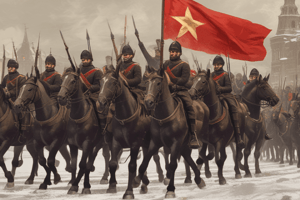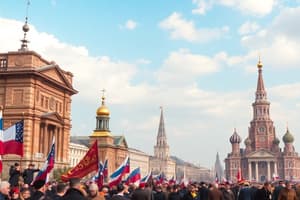Podcast
Questions and Answers
Welches Ereignis war ein direkter Auslöser für den Bürgerkrieg in Russland?
Welches Ereignis war ein direkter Auslöser für den Bürgerkrieg in Russland?
- Die Gründung der Sowjetunion
- Die Krönung von Alexander Kerensky
- Die Abdankung von Nikolai II. (correct)
- Die Einführung von War Communism
Die Bolschewiki setzten während des Bürgerkriegs eine Politik der totalen Freiheit um.
Die Bolschewiki setzten während des Bürgerkriegs eine Politik der totalen Freiheit um.
False (B)
Nennen Sie einen der führenden Figuren der Bolschewiki während des Bürgerkriegs.
Nennen Sie einen der führenden Figuren der Bolschewiki während des Bürgerkriegs.
Wladimir Lenin
Die ideologische Grundlage der Bolschewiki war das ________.
Die ideologische Grundlage der Bolschewiki war das ________.
Ordnen Sie die folgenden schlüsselfiguren ihren Rollen zu:
Ordnen Sie die folgenden schlüsselfiguren ihren Rollen zu:
Welche wirtschaftlichen Auswirkungen hatte der Bürgerkrieg auf Russland?
Welche wirtschaftlichen Auswirkungen hatte der Bürgerkrieg auf Russland?
Der Bürgerkrieg führte zur Schaffung eines Mehrparteiensystems in der Sowjetunion.
Der Bürgerkrieg führte zur Schaffung eines Mehrparteiensystems in der Sowjetunion.
Was war eine der langfristigen Folgen der Russischen Revolution?
Was war eine der langfristigen Folgen der Russischen Revolution?
Welche dieser Ursachen trugen zur Russischen Revolution bei?
Welche dieser Ursachen trugen zur Russischen Revolution bei?
Der Zar Nicholas II. wurde herzlich von der Bevölkerung unterstützt.
Der Zar Nicholas II. wurde herzlich von der Bevölkerung unterstützt.
Was war die Hauptfolge der Februarrevolution?
Was war die Hauptfolge der Februarrevolution?
Die Bolschewiki unter __________ übernahmen die Macht während der Oktoberrevolution.
Die Bolschewiki unter __________ übernahmen die Macht während der Oktoberrevolution.
Ordne die Ereignisse den richtigen Folgen zu:
Ordne die Ereignisse den richtigen Folgen zu:
Welches Ergebnis hatte der Vertrag von Brest-Litowsk?
Welches Ergebnis hatte der Vertrag von Brest-Litowsk?
Die Provisorische Regierung hatte vollständige Kontrolle über das Land nach der Februarrevolution.
Die Provisorische Regierung hatte vollständige Kontrolle über das Land nach der Februarrevolution.
Nenne einen wichtigen Ideologen der Bolschewiki.
Nenne einen wichtigen Ideologen der Bolschewiki.
Flashcards
Ursachen der russischen Revolution
Ursachen der russischen Revolution
Die russischen Revolutionen wurden durch eine Kombination aus wirtschaftlichen, politischen und sozialen Faktoren ausgelöst.
Wirtschaftliche Not
Wirtschaftliche Not
Große Armut, Nahrungsmittelknappheit und Arbeitslosigkeit führten in Russland zu Unzufriedenheit.
Politische Autokratie
Politische Autokratie
Die zaristische Regierung hatte wenig politische Freiheit und Repräsentation.
Folgen der Februarrevolution
Folgen der Februarrevolution
Signup and view all the flashcards
Oktoberrevolution
Oktoberrevolution
Signup and view all the flashcards
Sowjetunion
Sowjetunion
Signup and view all the flashcards
Russlands Rückzug aus dem Ersten Weltkrieg
Russlands Rückzug aus dem Ersten Weltkrieg
Signup and view all the flashcards
Provisorische Regierung
Provisorische Regierung
Signup and view all the flashcards
Russischer Bürgerkrieg (1918-1922)
Russischer Bürgerkrieg (1918-1922)
Signup and view all the flashcards
Bolschewiki (Rote)
Bolschewiki (Rote)
Signup and view all the flashcards
Lenin
Lenin
Signup and view all the flashcards
Stalin
Stalin
Signup and view all the flashcards
Marxismus-Leninismus
Marxismus-Leninismus
Signup and view all the flashcards
Bolschewistische Sieg
Bolschewistische Sieg
Signup and view all the flashcards
Wirtschaftliche Zerstörung
Wirtschaftliche Zerstörung
Signup and view all the flashcards
Study Notes
Russian Revolution, Civil War, Causes of the Revolution, Outcomes and Consequences, Key Figures, Ideological Streams
-
Causes of the Russian Revolution:
-
Economic hardship: Widespread poverty, food shortages, and unemployment fueled discontent among the populace. Peasants suffered greatly under Tsarist rule while industrial workers faced dangerous and exploitative conditions.
-
Political autocracy: The Tsarist regime was characterized by a lack of political freedom and representation. Opposition groups were frequently suppressed, and the government responded violently to dissent.
-
World War I: Russia's costly and unsuccessful involvement in World War I exacerbated existing problems. Military defeats, massive casualties, and the strain on resources led to widespread public anger and the collapse of morale.
-
Social inequality: A vast gap existed between the wealthy elite and the impoverished masses. Land ownership was concentrated in the hands of a few, creating resentment and fueling calls for land redistribution.
-
Weak leadership: Tsar Nicholas II was perceived as an incompetent and out-of-touch ruler, failing to address the nation's problems.
-
Outcomes and Consequences of the February Revolution:
-
Abdication of Tsar Nicholas II: The Tsar was forced to abdicate, ending centuries of Romanov rule.
-
Establishment of a Provisional Government: A temporary government was formed to govern the country until a new form of government could be established. This was initially enthusiastically received, but its ability to address the country's problems was limited.
-
Dual Power: The Provisional Government shared power with the Petrograd Soviet, a council of workers and soldiers, leading to political instability.
-
Outcomes and Consequences of the October Revolution:
-
Bolshevik seizure of power: Vladimir Lenin's Bolshevik Party seized power in Petrograd, marking a significant shift in Russia's political landscape.
-
Establishment of the Soviet Union: The Bolsheviks' victory resulted in the creation of the Union of Soviet Socialist Republics (USSR), ushering in a new era of communist rule.
-
Withdrawal from World War I: Russia signed the Treaty of Brest-Litovsk, exiting World War I, but at a significant cost in terms of territory.
-
Russian Civil War (1918-1922):
-
Bolsheviks (Reds) versus White armies: The civil war was a bloody conflict between the Bolshevik regime (Reds) and various anti-Bolshevik forces (Whites).
-
Foreign intervention: Foreign powers intervened on the side of the Whites, further escalating the violence and instability of the war.
-
War Communism: The Bolshevik regime implemented harsh economic policies and strict political control during the war.
-
Key Figures:
-
Vladimir Lenin: Leader of the Bolshevik Party and architect of the Russian Revolution.
-
Joseph Stalin: A rising Bolshevik leader who eventually consolidated power and became dictator of the Soviet Union.
-
Leon Trotsky: Close associate of Lenin and key figure in the early years of the Soviet regime, before falling out with Stalin.
-
Nicholas II: Tsar of Russia who was overthrown during the revolution.
-
Alexander Kerensky: Leader of the Provisional Government during a turbulent period.
-
Ideological Streams:
-
Marxism-Leninism: The dominant ideology of the Bolsheviks, advocating for a communist state. It differed from Marx's initial ideas through Lenin's concept of vanguardism (a leading party to lead the proletariate to revolution).
-
Anarchism: While present during the revolution, it played less of a guiding role than ideologies like Marxism-Leninism. Different anarchists sought varied outcomes, but few held significant power in the new government.
-
Liberalism and Constitutional Monarchy: These ideologies were challenged by the revolutionary fervor and replaced by Socialist approaches in general.
-
Outcomes of the Civil War:
-
Bolshevik Victory: The Bolsheviks ultimately prevailed in the Russian Civil War.
-
Political consolidation of the Communist Party: The Bolsheviks' triumph solidified their grip on power and established a one-party state.
-
Economic devastation: The civil war caused significant economic damage and upheaval, impacting all aspects of Russian society.
-
Long-Term Effects:
-
Establishment of a totalitarian state in the USSR: The revolution led to the formation of the USSR, characterized by strict central control and the suppression of dissent.
-
Global impact: The Russian Revolution served as an inspiration to communist movements worldwide, inspiring socialist and communist parties globally.
-
Rise of the Cold War: The ideological struggle between communism and capitalism ultimately contributed to the intense political tensions of the Cold War.
Studying That Suits You
Use AI to generate personalized quizzes and flashcards to suit your learning preferences.




